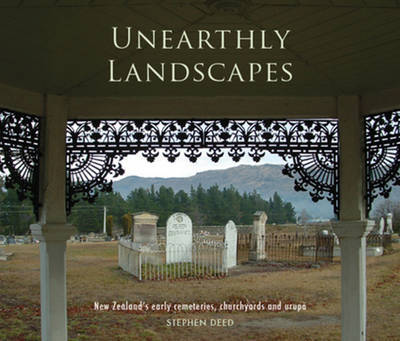Difference between revisions of "Unearthly Landscapes"
(Created page with " == Unearthly Landscapes. NZ’s Early Cemeteries,Churchyards and Urupā == Stephen Deed Otago University Press 2015 256pp ISBN 978-1-927322-18-5, $49.95 ===Blurb:=== By...") |
(→Unearthly Landscapes. NZ’s Early Cemeteries,Churchyards and Urupā) |
||
| (3 intermediate revisions by the same user not shown) | |||
| Line 1: | Line 1: | ||
== Unearthly Landscapes. NZ’s Early Cemeteries,Churchyards and Urupā == | == Unearthly Landscapes. NZ’s Early Cemeteries,Churchyards and Urupā == | ||
| + | [[File:Unearth.jpg|right]] | ||
| − | Stephen Deed | + | '''Stephen Deed''' |
| − | Otago University Press 2015 | + | '''Otago University Press 2015 256pp.''' |
| − | ISBN 978-1-927322-18-5 | + | ISBN 978-1-927322-18-5 |
===Blurb:=== | ===Blurb:=== | ||
Latest revision as of 23:10, 6 March 2016
Unearthly Landscapes. NZ’s Early Cemeteries,Churchyards and Urupā
Stephen Deed
Otago University Press 2015 256pp.
ISBN 978-1-927322-18-5
Blurb:
By the nineteenth century the ancient urban churchyards of Britain, burdened with generations of dead, were unable to cope with rising numbers of corpses. Partially decomposed bodies were regularly disinterred and dumped in pits to free up room for the newly dead. Fears about the danger to public health eventually put an end to the urban churchyard burial grounds, and by the time settlers set sail for New Zealand large ‘modern’ cemeteries were being established on the edges of towns and cities. Migrants therefore brought with them a range of burial practices. The land they arrived in already had a long tradition of Māori burial ritual and places, which would be transformed by this contact with the European world. The migrants’ own traditions were adapted to their new environment and society, creating burial places unique to New Zealand. Today, old cemeteries dot the countryside, but are often ignored. Yet the resting places of the dead are a reflection of the life of the surrounding community, and New Zealand’s early cemeteries have fascinating stories to tell. In this beautifully written and illustrated book, Stephen Deed sets out to reconnect the historic cemeteries we see today with the history of this country and its people.
